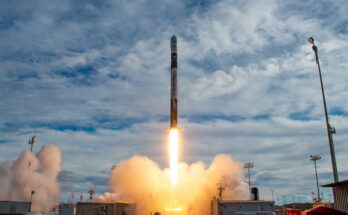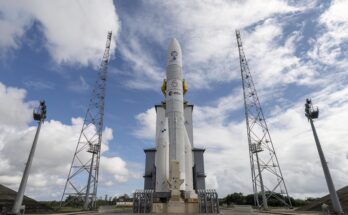
Isar Aerospace‘s highly anticipated first orbital launch of its Spectrum rocket ended in failure on March 30th, as the vehicle lost attitude control and crashed back to Earth approximately 30 seconds after liftoff. Despite the dramatic end to the launch, the German space startup declared the mission, dubbed “Going Full Spectrum,” a success, citing the valuable data gathered during the brief flight.
“Our first test flight met all our expectations, achieving a great success. We had a clean liftoff, 30 seconds of flight and even got to validate our Flight Termination System.” said Daniel Metzler, CEO and Co-founder of Isar Aerospace. “Now it’s time to analyze all data, learn, iterate and be back on the launch pad as soon as possible.”
The Spectrum rocket, designed to be a cost-effective and flexible launch vehicle for small and medium-sized satellites, lifted off from Andøya Spaceport in northern Norway at 6:30 a.m. Eastern. This launch marked a significant milestone, representing the first orbital launch attempt by a commercial entity from continental Europe outside of Russia. The rocket, powered by nine in-house developed Aquila engines using liquid oxygen and propane, aims to offer competitive launch services to the growing small satellite market. Isar Aerospace’s strategy focuses on a modular design and streamlined production to reduce launch costs and increase launch cadence.
The initial ascent appeared nominal, but approximately 25 seconds into the flight, the rocket began to exhibit instability. Shortly after the launch webcast announcer mentioned the planned pitchover maneuver, the vehicle started to tumble. Within five seconds, the rocket completely lost control and descended rapidly, impacting the ground near the launch pad and resulting in an explosion. Isar Aerospace executives later confirmed that the flight termination system was activated at the 30-second mark, leading to a controlled descent into a designated area in the sea.
While the loss of the vehicle is a setback, Isar Aerospace emphasized the successful achievement of its test objectives. The company highlighted the collection of crucial flight data, which will be used to analyze the cause of the failure and improve the Spectrum rocket’s design for future missions. An investigation involving Isar Aerospace, Andøya Spaceport, and Norwegian regulators is now underway to determine the root cause of the anomaly. The launch pad itself sustained minimal damage. Isar Aerospace remains optimistic about its future launch attempts and its position within the growing European space sector.
These events underscore the challenges of space exploration. Another German rocket system, the Rocket Factory Augsburg (RFA) One, suffered a setback last year with a launch from SaxaVord Spaceport in Scotland. A static, hot-fire test was performed in August 2024 which unfortunately ended in failure. Reportedly, there was a fuel leak that led to the destruction. The launch pad, an expensive piece of engineering, suffered minimal damage. There is currently work underway to build a new first stage and testing that stage. RFA is attempting a first launch in 2025.




